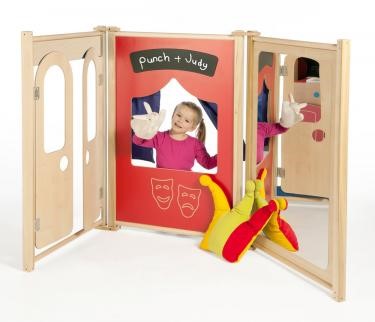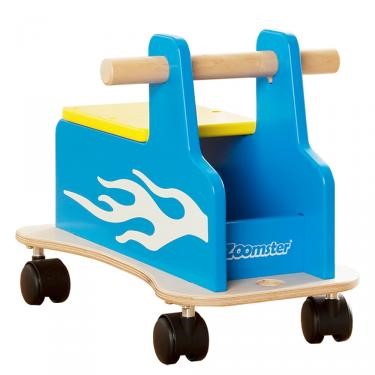Play is a vital factor that contributes to the development and growth of all children. It’s a chance for children to explore be creative and experience all kinds of emotions.
Whilst a child is playing, it is not just play time - it’s much more! A child’s play time includes dropping, catching, bouncing, throwing, building things and knocking them down. They are all important factors which contribute to learning real scientific and mathematical concepts as well as literacy and vocabulary skills.
You may think that your child is too young to be learning anything of real importance but even young babies enjoy and can take so much in from a simple change of scenery on a day out.
Play encourages children to experience new emotions, increase self-awareness and respect for themselves as well as other children. It builds on their social skills and enables them to socialise with other young children, share with them and involve them with their imaginative play.
Because play is so important to young minds we have put together 10 top reasons why play should be supported and encouraged!

Top 10 Reasons
- Encourages & develops literacy skills – play allows children to practise new sounds as they try out new words and experiment with their vocabulary. Story telling is essential for improving literacy skills as it gives them the opportunity to hear new words as well as try to pronounce them and express their imaginations.
- Improves communication skills – by playing and socialising a child learns how to communicate with others. Even if they are not speaking fluently their ability to read and understand other children’s emotions and actions help with the ability to express their own emotions.
- Play is the highest form of learning – play takes form in many different shapes, it can be in the form of a rattle for a small baby or a book for a toddlers. Play can be done alone, with an adult or it can be a part of a large group of children. There really are no limitations to play and how it should conducted.
- Play gives children options – most children have a selection of toys and various activities available to them. This allows them to choose what they feel like doing, their choice often reflects the type of learner they are. Some children will choose to play alone and some will only play in groups. Some would rather read a book and some are naturally more active. Each child is different which is why choice is necessary to play.
- Play encourages physical movement – for a child to know their limitations they must be able to be active, test their own abilities with balance and movement. Physical activity is necessary with young children in order to strengthen their bodies, maintain a healthy weight and prevent illnesses. It is important to instil an active mind set at an early age so that your child is more likely to have a healthy lifestyle in the future. Read our article on How to Encourage Physical Activity.
- Improves emotional skills – by playing with your child you will improve their social and emotional skills. When you play with them they are also learning that they are fun to be around and that they are loved – this improves their self-esteem and self-confidence.
- Play promotes a healthy imagination – children’s imaginations have the ability to see something beyond what it really is. It’s a beautiful thing and may not always make perfect sense to an adult watching, but children develop the ability to use something as simple as a truck for another purpose altogether. Having a healthy imagination is vital to child’s play and will enable them to participate in role play activities.
- Play teaches adults – playing with your child will often test your patience. The trick is to learn when the right time to intervene is, although some situations may leave you feeling frustrated and wanting to take over it is important to understand your child is learning and has to adapt each time to a new movement, skill or emotion and this may take some getting used to. The easy option is to take over – the right choice is to have patience and understand them.
- Play is fun – play should always be fun, interesting and stimulating. To avoid losing a child’s attention or interest in learning, play should always be encouraging, active and involve new activities that will stimulate their minds. This will set your child up to be content, loving and sociable which are all important skills needed for the rest of their lives.
- Play builds resilience to unexpected situations – through play a child learns how to cope with unexpected scenarios that will often creep up and test their emotions. Through risk taking, new challenges and problem solving a child will learn to feel new emotions, and how to react to them.

The first 5 years of their lives will determine how the rest will go – it is important that you make those first 5 years count!
Here at Early Learning Furniture we value how important play is to children’s development and we promote this. We are in the process of adding 100s of play products to our website which will support each aspect of play within the home, nursery, school and pre-school setting.
Our new small world play category will include the best-selling imaginative play panels. These can be linked to create various scenarios which help to promote role play for children. You can mix and match the play panels to create your own theme or we will offer ready made sets based on a theme such as lifestyle, professional and theatre.
Our small world range also includes a selection of wooden play equipment that you find in everyday life, such as a driving centre, farm, garage, train, bus and ship.
Our home corner will feature an array of wooden play kitchens and market stalls which encourage group play, stimulate imaginations and encourage children to act out everyday tasks.
It features a wide range of wooden toys for your nursery or school home corner including complete children’s play kitchens and individual play kitchen appliances such as play sink, play cooker, play fridge and play washing machine.
Our new school physical play category will include the multi-award winning Zoomster, and Practical Pre-School Award winning Seaweenies water tray.
A selection of wooden play equipment designed for school physical play. Whether children want to enjoy the toddler activity centre, race around on a ‘Zoomster’, build an indoor den, pretend to be a pirate, train driver or bus driver or have an underwater adventure with the Seaweenies, we have something to suit your nursery or school.
We are UK suppliers of educational furniture predominantly for the early years' age groups in primary schools, pre-schools, playgroups and nurseries. Here at ELF we pride ourselves on offering great value, quality products backed up by a reliable and flexible service.
For more information on any of our early learning products please contact us or call our sales team on 01733 511121.
Permalink:
https://www.earlylearningfurniture.co.uk/blog/10-ways-play-encourages-learning-in-early-years.aspx